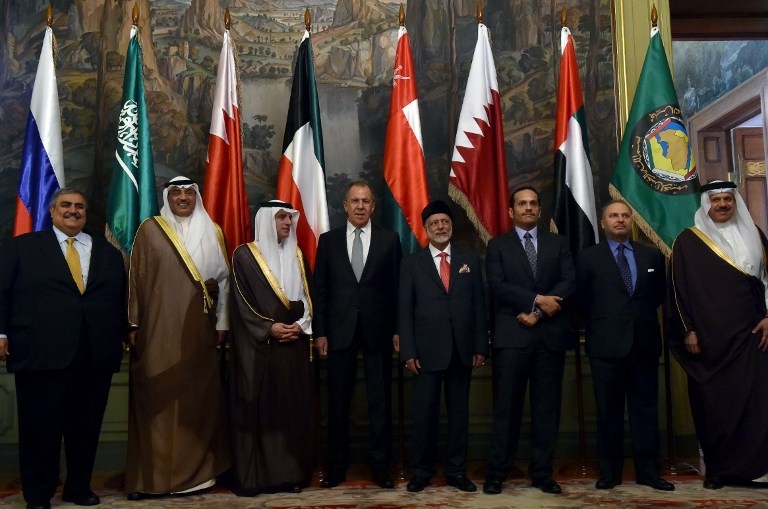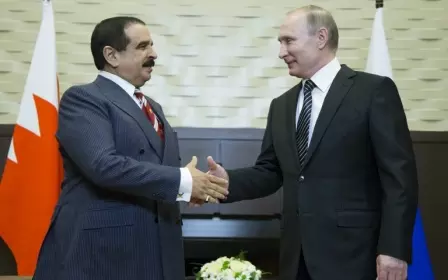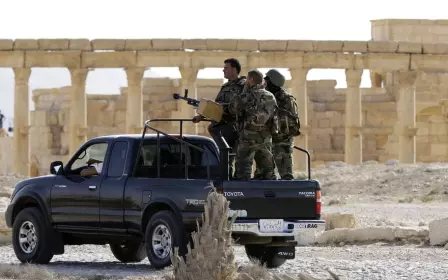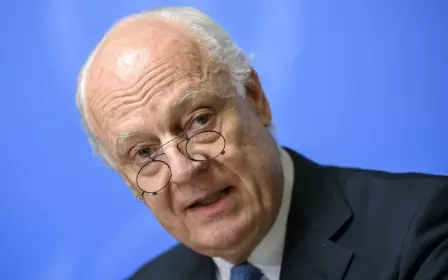ANALYSIS: Russia comes in from the cold - and towards the Gulf

When Bahrain's King Hamad bin Isa al-Khalifa presented Russian President Vladimir Putin with a "sword of victory” during a visit to Russia last February, it was a defining moment that showcased the arrival of Moscow to the heart of Gulf politics.
“Relations are generally getting closer,” said Hussein Ibish, senior scholar at the Arab Gulf States Institute in Washington.
Increasingly frequent meetings between Moscow and Arab petro-monarch officials shows a warming of relations as the Syrian civil war has provided both a golden opportunity for Russia to exert its influence in the region – as well as a series of potential pitfalls for Arab-Gulf relations.
For Russia, engagement with Gulf countries, particularly Saudi Arabia, is necessary to reach a solution in Syria which Moscow fears could spillover towards Russia’s hinterlands and beyond.
And with the US pivoting away from traditional Gulf allies following the landmark nuclear deal with Iran, Gulf countries see Russia as perhaps their best chance to block what they see as Tehran’s seeping influence in the region, particularly in Syria.
“A volatile and unclear American policy resulting with the disappointment of Arab states toward their traditional ally provides Russia with an opportunity,” Maxim Suchkov, expert at the Moscow-based Russian International Affairs Council, said.
If Russia and Gulf countries continue to grow closer together, Moscow may be persuaded to play a more constructive role in Syria and potentially in Iraq, something Gulf countries would like to see, analysts say.
But while there are mutual interests to develop ties, can Russia and the Gulf countries overcome the challenges in this moment of golden opportunity?
Mutual interests
Relations between the Arab world and Russia date back to the Soviet era, during which Moscow maintained close ties with Arab countries such as Algeria, Egypt and Syria, all of whom were influenced by socialism.
Ties between Moscow and the Gulf, however, have been largely non-existent, overshadowed by the US and the UK relations with the countries that are now part of the Gulf Cooperation Council (GCC).
That is until now: Syria and the security threat posed by the five-year civil war has brought a changing balance of power to the Middle East, leaving the Gulf and Russia with a growing need to engage, say analysts.
“The Arab world is recognising Russia as an effective major power,” said Abdel Aziz Sager, head of the Gulf Research Centre a Dubai-based think tank. “There is greater awareness of a need to rebuild bridges between Russia and Arab states.”
Moscow is motivated to develop ties with the Gulf to insure the stability in the Caucasus and Central Asia, which it views as highly dependent on events in the region.
“This requires the preservation of strong states because failing countries bear greater risks for Russia’s security,” said Suchkov.
Nikolay Khozanov, non-resident fellow at Carnegie Endowment also told Middle East Eye that: “Moscow knows that any solution in Syria requires talking to Gulf states.”
The Syrian government and its allies - Iran, Hezbollah, and Iraqi Shia groups - have grown much more dependent on Moscow to ensure the survival of Syria President Bashar Assad.
Until Russia’s intervention in the war last September, Assad was losing territory. Moscow shifted the power balance significantly, making itself an unavoidable interlocutor for Gulf countries with interests in the war.
“The Saudis have recognised that it is essential to get Moscow to willingly accept, and ultimately support, a post-Assad future in Syria,” said Ibish.
“From the Gulf Arab perspective dislodging Iranian control of Syria, which means replacing Assad at the very least, is considered existential and non-negotiable. This is by far the single most important basis for the present outreach to Moscow.”
Arms and Energy
Beyond Syria, both Russia and the Gulf states are also motivated to improve their ties in order to bolster economic relations.
For Moscow, the Gulf could mitigate the consequences of international sanctions imposed on the country after the annexation of Crimea in 2014 and reduce its reliance on Western financial institutions.
“Moscow is eying Gulf countries’ markets and wants to increase the volume of Arab investments,” said Khozhanov.
According to a report published in May by Trends Research and Advisory, a United Arab Emirates-based think tank, the volume of trade between GCC countries and Russia, which ranged from $1.8-$1.9bn in 2015, is very low and the GCC share in Russian trade was less than 0.5 percent.
Russia, according to the report, is pushing for cooperation in projects outside the Middle East region, including a Russian–Abu Dhabi proposal to build a new international airport in Havana, Cuba.
The field of energy may hold the most potential for trade relations. Last year, Saudi Arabia signed a cooperation agreement with Russia, including a peaceful nuclear programme deal.
The military industrial sector may also benefit from a Russian-Arab rapprochement and could be the main axis of future relations, said Abdul Aziz Sager.
“Reducing dependence on external sources in the field of security and defence is consistent with Arab objectives, especially those of the Gulf states,” he said.
Algeria and Egypt remain the biggest buyers of Russian arms. In 2014, Russia and Algeria signed a $2.7b contract, according to Suchkov, which followed a 2006 arms contract between the two countries for $7.6b when Russia became a major arms supplier to Algeria.
Egypt also signed contracts in 2014 to purchase Russian attack helicopters, multi-role fighters, air defence systems and mobile coastal missile systems. Russian anti-tank weapons have also been purchased by Egypt, Jordan and Bahrain, he said.
Potential pitfalls
But Russia and Gulf countries will have to overcome significant obstacles in order to foster their budding relations. One major hurdle: strong Arab relationships with the US which will restrict Moscow's opportunities in the Arab world.
But the main challenge, said Ibish, “is Russia’s own orientation strongly in favour of Iran and its allies, particularly in Syria. That's a hell of an obstacle.”
Another challenge, said Sager, are Russia and Saudi’s opposing views on the war of terror. Saudi Arabia sees the war in Syria purely as a revolution against a dictator.
For Saudi, the emergence of extremists groups in Syria “was the result of the weakness of the international community and its failure to support the oppressed population,” Sager said.
In Moscow, however, there’s a strong belief that authoritarian governments, like Assad’s, are better at cracking down on Islamist militants.
“Many in Russia still point to Libya – as the victim of the uprisings – and Egypt where the Muslim Brotherhood came to power as a result of democratic elections. So, for Moscow, the choice has never been between good and bad, but rather between bad and terrible,” said Suchkov.
Diverging views on Arab revolutions are not the only factors disrupting Russian-Gulf relations. Russia still mistrusts Gulf countries because of their support for separatist movements close to its borders, said Khozanov.
Saudi Arabia, for example, sided with Afghanistan’s mujahedeen during the 1979 Soviet invasion. The unrest there spilled over into Russia’s North Caucasus regions, namely Chechnya, Dagestan and Ingushetia, and led to the rise of terror attacks in Russia.
Conversely, Moscow doesn’t see Iran as the main regional troublemaker, as it does not threaten its neighbourhood. “Moscow would like to stay away from the very regional sources of problems – part of the reason it stays rather neutral in the Saudi-Iranian spat,” said Suchkov
Another obstacle is that Arab states are still pro-Western in their orientation given their continued dependence on the US for military equipment, training, services and doctrine.
“There's just no basis for the Arab states, no matter how disgruntled they are, to seriously believe they would get a better deal from Moscow, and they know that,” said Ibish
In addition, Russia does not possess enough capabilities to project the influence necessary to mediate the tensions between Saudi and Iran, a key quality needed to fill the regional power vacuum, say analysts.
Russia may project a super power image in Syria, but the country, analysts say, does not want to be in the middle of the Saudi-Iran spat.
“Moscow is looking for a niche in the region and to balance between powers. It is equally interested in maintaining relations with Iran, Israel and Saudi Arabia while trying to manoeuvre between these players,” said Khozanov.
Golden moment
Despite the challenges, Moscow can still profit from the confidence gap between the Arab world and the US.
“Russia’s historic opportunity may not last long. The Arab world is seriously looking for allies and friends outside its traditional relations framework,” said Sager.
Russia has the potential to bring in constructive development to the region, if it decides to play fair in Syria, “by helping guide political transition in the country,” said Suchkov.
What happens next in Syria may very well determine the viability of Russian-Gulf relations.
New MEE newsletter: Jerusalem Dispatch
Sign up to get the latest insights and analysis on Israel-Palestine, alongside Turkey Unpacked and other MEE newsletters
Middle East Eye delivers independent and unrivalled coverage and analysis of the Middle East, North Africa and beyond. To learn more about republishing this content and the associated fees, please fill out this form. More about MEE can be found here.




